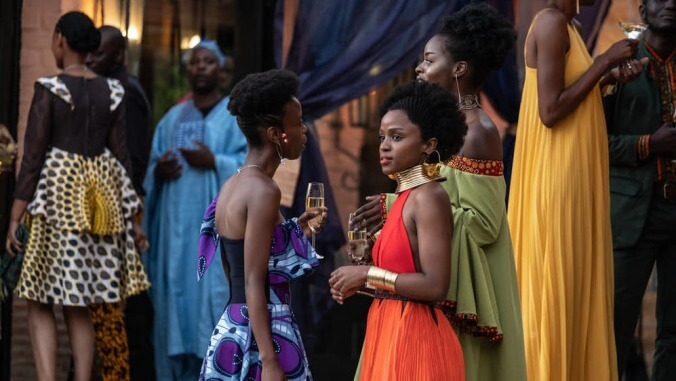Peacock’s Noughts + Crosses is a flawed race-reversal narrative


In the first scene of Noughts + Crosses, a new series from Peacock, the racial power dynamics in the fictional colony of Albion quickly become clear—the three young white men stopped by police have no privilege in society, while the Black officers who detain them have too much. In this alternate universe, based on Malorie Blackman’s award-winning young adult book series, the Aprican Empire invaded Europe more than 700 years ago and colonized the continent, reaching as far as Albion. A stand-in for England, that country has been ruled by Aprica, a substitute Africa, ever since.
In a colony dominated by Black supremacy, everyone with influence—from politicians to journalists to professors—has dark skin. Known as the Crosses, members of the ruling class wear their hair in its natural tightly coiled texture and don clothing with African prints. Meanwhile, the Noughts, the colonized white people, imitate them with locs, braids, curls, and similar but cheaper attire. Based on the British name for tic-tac-toe, the labels Noughts and Crosses illustrate how arbitrary these social roles are. In Albion, Black people happen to be the haves and white people the have-nots. Social mobility is nearly impossible in the country, with the white population comprising a permanent underclass—employed as domestic and dock workers, if they can find jobs at all.
In the middle of this premise is the ambitious Callum McGregor, played by a capable Jack Rowan. Although he’s white and working-class, Callum is striving to get into the famous military academy Mercy Point, a goal that makes him a sellout, according to his brother, Jude (Josh Dylan), who joins a group of political radicals after the police brutalize his friend. Soon, Callum’s plan to attend Mercy Point isn’t the only reason he feels caught between two worlds. When he helps his housekeeper mother Meggie (Helen Baxendale) serve cocktails at the birthday party of her employer, the wife of a high-ranking dignitary, Callum locks eyes with a beautiful Black woman named Persephone “Sephy” Hadley (Masali Baduza). The two manage to get a moment alone together—interracial relationships are illegal in Albion—and realize they once knew each other. His mother has long worked for the powerful Hadley family, but Callum has not seen Sephy since they were children. Fueled by little else than nostalgia and sexual chemistry, the couple begins a secret, taboo romance.
Sephy’s boyfriend, Lekan (Jonathan Ajayi), senses she’s attracted to Callum, which complicates matters because he’s a mid-level officer at Mercy Point. And Sephy’s politician father, Kamal Hadley (Paterson Joseph), is a segregationist who opposes Nought-Cross relationships, though he’ll be proven a hypocrite. Callum’s family may lack social capital, but his brother Jude’s efforts to gain power via a violent militia group will threaten his relationship with Sephy. While there’s no shortage of obstacles in the couple’s path, Noughts + Crosses doesn’t develop their relationship well enough in the beginning to convince the viewer they’d be willing to risk it all for each other.
The show’s other flaw is that it doesn’t fully explain to viewers the world beyond Albion. Sephy and Callum ponder running away to Aprica together, where they’ll supposedly be able to love each other openly, but Noughts + Crosses never explains why this is. Also, while the show paints a world where white people have virtually no power—there are echoes of the Jim Crow South, South African Apartheid, and the English rule of Ireland—it vilifies the Noughts who fight against their oppression. The message seems to be that the oppressed and the oppressor operate on the same moral ground, and Jack Dorn (Shaun Dingwall), the leader of the militia group strategizing to take power back from the Crosses, is a ruthless killer who’s in the liberation movement solely for his own gain. Intentionally or not, the suggestion that there are very bad people “on both sides” is a tacit endorsement of the colonialism the show depicts. And that colonialism is explicitly European in nature. Sephy Hadley quotes Machiavelli, and she, along with her sister, Minerva, is named after a Greco-Roman goddess instead of, say, a Yoruba deity. The fault here evidently lies with the source material, as the author of the book series says she called those characters Persephone and Minerva mainly because “I wanted classical names.”
For all Noughts + Crosses does to imagine a society in which Aprican people dominate, including having characters greet each other in the Yoruba language, it doesn’t consider that an Aprican approach to rule might look very different from one European in origin. In this way, it mirrors the 1995 movie White Man’s Burden in which the African American elite segregates and lords over the white underclass. Similarly, the subjugation that the Noughts endure is virtually indistinguishable from how people of color have been dehumanized in real life. The Crosses joke about the Noughts’ skin color, intelligence, and sex lives, and the Cross-led law enforcement agencies terrorize Albion’s underclass with impunity. During a speech that sounds inspired by Philando Castile’s tragic biography, Callum rehashes how he’s been stopped by the authorities more than 300 times. But the idea that those who have been historically oppressed would behave the same way that their oppressors do if they had power suggests that the evils of racism and conquest are human nature rather than learned behaviors and sociopolitical constructs.
The central romance doesn’t fare exceptionally well either. After a series of setbacks, Callum divests from his dreams, his relationships, and Cross society. Rather than fight the racial stratification that holds him back in a productive way, he becomes increasingly reckless. This turn of events is hard to believe given Callum’s portrayal as a sensitive and responsible person throughout the series. Equally implausible is that the couple’s relationship could withstand all the challenges that have confronted it by the conclusion.
Although Noughts + Crosses is an imperfect series, it features some compelling performances, particularly from Rowan, Joseph, and Baxendale. (Fans of the British rapper Stormzy will appreciate his small role in the show as well.) In the end, the acting saves the series from a romance that’s initially undercooked and a race-reversal narrative that could do more to complicate its alternate universe. The Apricans are imitation Europeans rather than unique people with distinct perspectives on culture, ideology, and power. While Noughts + Crosses flips society’s racial dynamics, it doesn’t go beyond the surface when it comes to imagining a world that lacks the legacy of white supremacy.